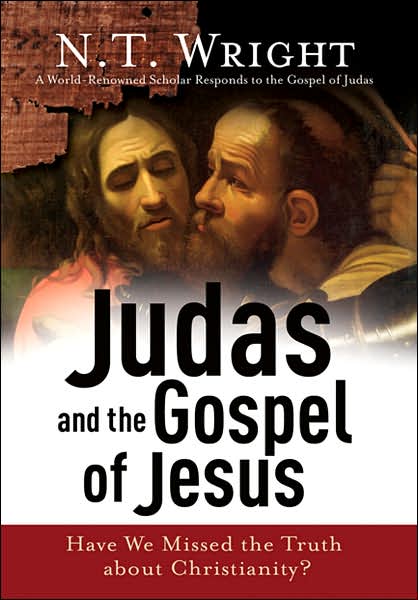
©2006 Baker Books, Grand
Rapids
The name of N. T. Wright is fairly familiar in the arena of
theological thinkers. Modern Christian ministers, if they haven’t read some of
his writings or about him in places like Christianity Today, have at the very
least heard the name or seen it on the spine of a book or two when they were
looking for the latest pop culture influenced book at their local Christian
bookstore. Wright is not only a bishop in the Church of England, but is a
Biblical historian and teacher of New Testament at institutions such as Oxford and Cambridge.
In recent years when another “new” gospel started creeping
into theological circles, he half-heartedly ordered a copy of the translation
and began piecing together what this so-called “Gospel of Judas” had to add to
serious theological study. What he found was an authentic third century
document that attempted to discredit and/or “correct” the New Testament account
found in the canonical gospels (Matthew, Mark, Luke, and John).
Lauded by modern-day Gnostics, the document in question is
part of a larger find which was discovered in the 1970s but was not finally
studied and translated until thirty years later. The text of the document,
while not considered a forgery and hoax (as many Believers would hope), turns
out to be an early Gnostic tale about how Judas Iscariot was really the hero of
the New Testament story because he was acting in obedience to Jesus in His
conspiracy to rid Himself of the earthly body in which He was trapped.
This and several other heretical Gnostic teachings are
addressed in this book of historical apologetics. Wright takes time to explain
some of the basics of Gnosticism and contrast them with what has been taught as
orthodoxy throughout the centuries. Ideas like the Creator-God is evil and
should not be worshiped as should the greater gods than He. Wright does two
things in this short and readable book that are well worth the reader’s time to
see:
- He sets aright the true Gospel in contrast to what proponents of this “new gospel” have tried to topple—namely, the Biblical record of Christ.
- He addresses issues that seem to sidetrack modern-day Christians who get caught up in one tangent or another in their faith-walk. In doing so, he reminds readers that they need not fear what intellectuals with big vocabularies are spouting when we have Truth on our side.
Conservative Evangelicals will thrill and cheer as Wright
discredits the Gnostics and the supporters of this new “Gospel of Judas.” But
then we begin to understand the audience of the Old Testament prophet Amos when
he was proclaiming the oracles against all the nations surrounding Israel. You
might recall that each nation was called down for their sins against God.
Finally, the prophet narrowed the focus to Judah
and then to Israel
herself—and the proclamation against Israel was far more serious than
that of her neighbors because of the depth of her transgression. Israel, after
all, as a nation was “the people of God” and should have known better.
In this same manner, Wright after setting the scene for the
dismissal of the Gospel of Judas as authoritative (even if it is an authentic
third century document) and Gnosticism in general (either the early New
Testament era version or the more modern variation), he levels his sights on
the modern evangelical movement (American Protestantism in particular) to call
us on our propensity to amalgamate certain teachings of the Gnostics into our
own instruction just to keep from having to take part in debate over issues
we’d rather ignore. The last chapter of the book is a bit harder to take, but
its truth cannot be denied. We as Christians ought to be less defensive over
our man-made traditions and more concerned with living as the Scriptures dictate.
Even though I feel a bit scathed having read the last pages,
I can’t help but give Wright four and one-half reading glasses. This defense of
the True Gospel in light of late archeological discoveries which would try to
disprove that Gospel is one that will be helpful to both the academic and the
layman alike. It will help you know more why you believe what you believe about
the Passion of the Christ.
—Benjamin Potter December 6, 2012










No comments:
Post a Comment